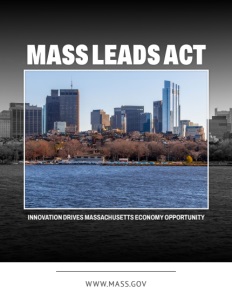Innovation Drives Massachusetts Economy Opportunity
Known for its great educational opportunities and worker productivity, this state is in the driver’s seat
Massachusetts is known for its innovative economy, rated as such by the Milken Institute and Bloomberg in recent years. The essential element of the state’s innovative economy is its highly talented workforce. Massachusetts has the best performing public schools in the nation, according to the Nations Report Card, 2024. It is the most educated state in the U.S. and annually ranks first or second in worker productivity.
In the global competition for cutting-edge industries and talent, Massachusetts has also sought to be innovative with its state economic development policies.
In December 2024, Massachusetts Governor Maura Healey signed the Mass Leads Act. The new law invests just under $4 billion in new programs and incentives to make Massachusetts a global leader in emerging industries like climate-tech and applied artificial intelligence, as well as building the state’s preeminent position in the life sciences.
Highlights of the Mass Leads Act include a $500 million capital reauthorization of the state’s renown Life Sciences Initiative, and an expansion of a tax credit program designed to spur job creation and growth in the life sciences industry. An investment of $400 million in the climate-tech industry will feature a new tax incentive. A $100 million initiative will create the Massachusetts AI Hub to boost innovation and attract AI talent to the state.
Mass Leads includes several investments in infrastructure, including a $400 million reauthorization for the MassWorks program, which supports public infrastructure improvements, $100 million for the Seaport Economic Council to support growth in coastal communities, and $250 million for the new Mass Impact Fund to support large, transformational projects that have the potential to yield significant economic impact.
“Massachusetts is the best state in the nation to live, work, go to school, raise a family and build a future. That’s in large part due to our commitment to investing in cutting-edge industries that produce transformative innovations and make life better for people. The Mass Leads Act builds on this leadership, positioning us to be the global hub for climate innovation and applied AI, while also growing our already world-renowned life sciences industry,” said Governor Healey.
The Mass Leads Act builds upon fundamental strengths in Massachusetts. Its highly talented workforce supports an array of advanced industries, including life sciences, aerospace/defense/robotics, information tech, financial services, advanced manufacturing, and clean/green/blue tech. Massachusetts is home to over 100 colleges and six of the top 10 medical research facilities in the U.S.
As a result, it receives the most basic research funding per capita in the nation. It also ranks first in the nation as a destination for venture capital on a per capita basis. These are key ingredients to the Massachusetts innovative economy. A talented workforce, an incredible concentration of best-in-world research institutions, and entrepreneurial depth drive new ideas, new technologies, and new job creation.

Mass Leads, as well as long-standing programs such as the Workforce Training Fund grant program and the many financing programs offered by MassDevelopment, also provide support for the state’s many traditional industries, from food processing to commercial fishing (New Bedford has the nation’s largest commercial fishing fleet).
Innovation extends to how Massachusetts delivers economic development programs. “Team Massachusetts”, adopted as the mantra by the administration of Governor Healey and Lt. Governor Kimberly Driscoll, includes an array of state agencies and non-profits working together to champion projects of economic benefit. Massachusetts Secretary of Economic Development Yvonne Hao, captains this team approach.
“From day one, we have set out to make Massachusetts the best place for individuals to pursue rewarding careers and for companies to start, scale and succeed,” Secretary Hao states. The Team Massachusetts approach exemplifies the commitment of the state government to work with developers, employers, and municipalities to move job creation opportunities forward. The Mass Leads Act has given Hao’s team added tools. “With this Act, we are positioning Massachusetts to lead for future generations. This is the ambitious north star for our state’s economic future.”
MassEcon is a core member of Team Massachusetts. The provision of site selection services is one of its central programs. In 2024, MassEcon provided services to 90 site location projects, assisting in announced projects that will deliver 2,380 new jobs to Massachusetts in 2.6 million square feet of facility space. Recent Massachusetts successes have included landing Lego’s Americas headquarters and Eli Lilly Innovation Center in Boston, as well as the expansions of biomanufacturing facilities for Moderna and Sartorius in Marlborough, Astellas research in Cambridge, a new facility for the climate-tech company Munters in Amesbury, and Werfen, a diagnostics company, in Bedford.

“It has been a very active period for projects considering Massachusetts as a place to expand or relocate commercial operations,” stated MassEcon’s executive director, Pete Abair. “The ability to move quickly to assist these prospects through the Team Massachusetts approach has delivered demonstrable successes.”
Massachusetts includes 351 cities and towns. With no country government, the municipalities play the important “last yard” role in getting any economic development opportunity across the goal line. Again, the Team Massachusetts approach assists municipalities interested in new economic opportunities. While many cities have high-capacity planning and development offices, smaller towns are more limited in economic development expertise. Team Massachusetts, operating through organizations like the Massachusetts Office of Business Development, MassDevelopment, MassEcon and others, works closely with town officials to identify potential impediments to economic development projects and pursue successful strategies to make job creation opportunities a reality.
While Massachusetts has competitive economic incentives that are now augmented thanks to the Mass Leads Act, it is known as a higher cost state. Housing costs are a concern as the state seeks to attract and retain its strong workforce. Massachusetts has ambitious plans to meet the challenge. In February 2024, Governor Healey unveiled the state’s first comprehensive housing plan, which calls for the creation of 220,000 new units of housing by 2035. Funding programs are already operating that will create 80,000 of these units, with new proposals in development to meet the higher goal.
As Massachusetts seeks to lower housing costs, its economic developers herald the state’s considerable competitive advantages. “While we are not a low-cost state, we offer very high value,” MassEcon’s Abair emphasizes. “For our residents, we have the best performing public schools, outstanding health care that isn’t restricted by the government, and ample employment opportunities in traditional and emerging industries. We offer safety, with the lowest property crime rate, second-lowest overall crime rate, and second-lowest level of gun violence in the nation. Our communities don’t have gates. They are vibrant, walkable, and safe. For employers, we offer compelling incentives and a collaborative approach to assist you. When you talk to one of us, you will have a whole team working to help you grow in Massachusetts.”
AT A GLANCE
Who: Mass Leads Act
What: Initiatives to help drive the thriving Massachusetts economy and tap into its hard working and educated workforce
Where: Massachusetts, USA
Website: www.mass.gov


